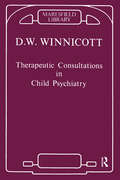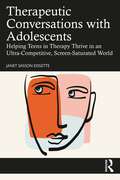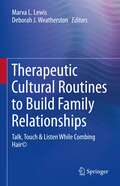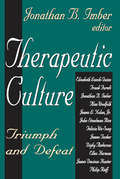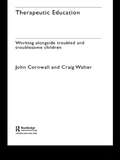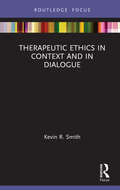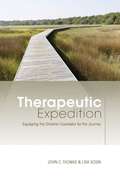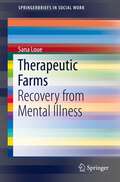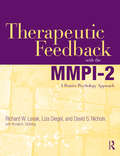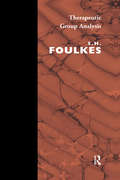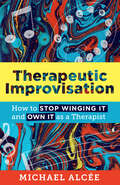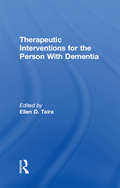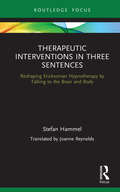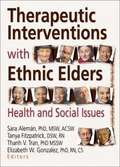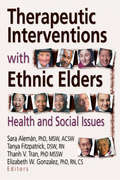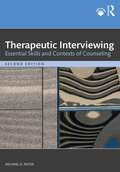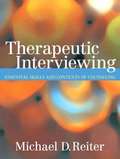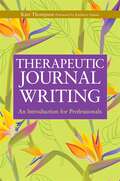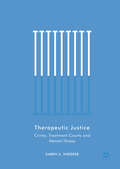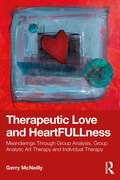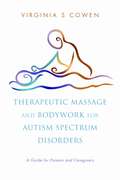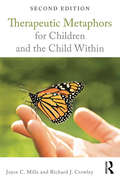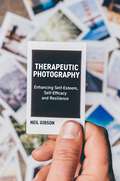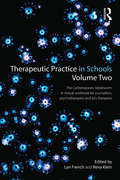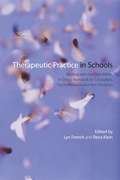- Table View
- List View
Therapeutic Consultations in Child Psychiatry (International Psycho-analysis Library #No. 87)
by Donald W. WinnicottOver a period of several decades, the author evolved a personal way of relating to and communicating with children, offering them a live professional setting in which to discover themselves. He believed that, in the right case, a full and free use of the first interview can yield rich rewards, and he claimed that the right cases for this are common. He hoped that, by presenting these case studies, he would introduce the reader to the exciting potential of his approach, which depends as much on selection (of therapist) as on training. Here is his presentation - seventeen case histories whose significance for child psychiatry is in the tradition of Freud's case histories of the treatment of adult neurotics. Therapeutic Consultations in Child Psychiatry provides a fruitful feedback to psychoanalysis itself.
Therapeutic Conversations with Adolescents: Helping Teens in Therapy Thrive in an Ultra-Competitive, Screen-Saturated World
by Janet Sasson EdgetteTherapeutic Conversations with Adolescents takes readers into the office of a seasoned therapist, where they can be a fly on the wall of live therapy sessions. Full of actual dialogue and the processing behind the choice of responses and interventions, this book stands in contrast to the dozens of books about adolescent therapy that discuss only theory, conjecture, and generic strategies. Teenagers today need therapists who can offer robust and unpretentious therapeutic relationships, as well as conversations that matter enough to hold their clients’ attention and make them want to come back for more. Readers will come away from this book understanding how to tread the delicate balance between the support and confrontation, the forthrightness and discretion, and the humor and tenacity that therapists need to make a real and lasting impact with teenagers.
Therapeutic Cultural Routines to Build Family Relationships: Talk, Touch & Listen While Combing Hair©
by Marva L. Lewis Deborah J. WeatherstonSocial workers and Infant and Early Childhood Mental Health (IECMH) helpers need practical, relationship-based clinical tools to support families experiencing stress, separation, and loss. Research reveals key parenting behaviors occur during hair combing interaction (HCI) – lively verbal interaction, sensitive touch, and responsiveness to infant cues. This book explores how the simple routine of combing hair serves as an emotionally powerful, trauma-informed, culturally valid therapeutic tool for use by mental health helpers. HCI offers a low-cost opportunity for IECMH helpers to engage families and sustain attachment relationships. In this book, case studies illustrate the use of HCI with diverse families of color. Each chapter includes questions for reflective supervision to understand sociocultural factors that may shape behaviors during HCI. Topics included in the text: The Observing Professional and the Parent’s Ethnobiography Introduction to Reflective Supervision: Through the Lens of Culture, Diversity, Equity, and Inclusion A Case Study in Cross-Racial Practice and Supervision: Reflections in Black and White Tools to Disrupt Legacies of Colorism: Perceptions, Emotions, and Stories of Childhood Racial Features Therapeutic Cultural Routines to Build Family Relationships: Talk, Touch & Listen While Combing Hair© is a unique resource for counselors, psychologists, psychiatrists, home visiting nurses, early childhood educators, and family therapists who work with military families or multiracial families with bi-racial children.“This book provides practical insights useful for professionals and parents. The authors share compelling experiences using strength-based and rich cultural approaches guided by reflective practice. It deserves to be widely read and become a classic resource.” Robert N. Emde, Emeritus Professor of Psychiatry, University of Colorado School of Medicine
Therapeutic Culture: Triumph and Defeat
by Donileen LosekeFor nearly half a century, social scientists have made claims that there is a "therapeutic ethos" with extensive influence upon numerous aspects of American society. In Therapeutic Culture, twelve authors address the implications of this ethos and its effects on a wide range of social institutions, extending from the family to schools, and operating in religious behavior and within the legal system. Has there been, as the sociological theorist Philip Rieff argued in 1966, a "triumph of the therapeutic?" If so, in what kinds of institutions has it been most pervasive? At the same time, what aspects of modern culture has it replaced or defeated? Therapeutic Culture addresses these questions, and raises others. Part 1 of this volume examines the emergence of the idea of "authenticity" as it defines the manipulation of emotions and behavior both in the United States and Great Britain. Contributors include Elisabeth Lasch-Quinn, Frank Furedi, Jonathan B. Imber, and Alan Woolfolk. Part 2 illustrates specific cases of the effects of therapeutic culture within institutions, including courts, schools, religious communities, and the "virtual community" of the Internet. Contributors include James L. Nolan, Jr., John Steadman Rice, Felicia Wu Song, and James Tucker. Part 3 extends the analyses of specific social institutions to the broader consequences that have resulted as a therapeutic ethos has taken root in contemporary life. Contributors include Digby Anderson, Ellen Herman, and James Davison Hunter. Part 4 is devoted to a previously unpublished essay by Philip Rieff whose significant influence can be seen in many of the contributions. Rieff revisits the highly controversial confirmation hearings of Supreme Court Associate Justice Clarence Thomas in 1991 and offers ample evidence of the therapeutic uses of politics as well as the political manipulations available within a therapeutic culture to provide a fitting conclusion. This volume establishes a benchmark for furthe
Therapeutic Education: Working alongside troubled and troublesome children
by John Cornwall Craig WalterThe role of therapy in schools is a topic that has been significantly under-researched and often overlooked. Considering the number of students in full-time education with serious emotional and behavioural difficulties, the skills and tricks used by therapists can be usefully passed on to teachers in the classroom. This book traces a substantial four-year project that applied the principles of therapeutic education in one school setting and exposed how current educational contexts actually contribute to disaffection and disruption of young people's learning. The authors propose a practical model of school and curricular experience, based on therapeutic relationships, that has led to outstanding positive results in school development. With suugestions throughout for tried-and-tested strategies that really work, this book will help professionals turn troubled young people's experience of education from the nightmare it often is, into an adventure with positive results for lifelong learning.
Therapeutic Ethics in Context and in Dialogue
by Kevin R SmithThe standard view of psychotherapy as a treatment for mental disorders can obscure how therapy functions as a social practice that promotes conceptions of human well-being. Building on the philosophy of Charles Taylor, Smith examines the link between therapy and ethics, and the roots of therapeutic aims in modern Western ideas about living well. This volume builds on a complementary volume (The Ethical Visions of Psychotherapy), to explore therapeutic conceptions of human flourishing. Smith illustrates how therapeutic aims implicitly promote ideas about a good life, even though therapists rarely tell their patients how they should live. Taylor’s history of the modern identity provides a framework to examine the historical and cultural origins of therapeutic ethics. Utilizing Taylor’s work on practical reasoning and ethical debate, Smith considers the prospects for dialogue between the divergent ethical visions promoted by different psychotherapies. A key text for upper-level undergraduates, postgraduate students, and professionals in the fields of psychotherapy, psychoanalysis, theoretical psychology, and philosophy of mind.
Therapeutic Expedition: Equipping The Christian Counselor For The Journey
by John C. Thomas Lisa SosinFor undergraduates and those pursuing a master's degree in counseling, psychology, social work, or pastoral counseling, Therapeutic Expedition is the only comprehensive basic helping skills textbook built upon a biblical world-view. Authors John C. Thomas and Lisa Sosin pull from their combined fifty years of clinical and classroom experience to prepare future counselors for their professional journey, fostering specific skills application in the areas of: Creating a helping relationship Assigning homework Exploring the counselee's concerns Spiritual strategies Facilitating the sessions Using metaphors Assessing the counselee The book's unique combination of qualities-a practical approach highlighting professional and personal growth based on authoritative, interdisciplinary, and biblical worldview outlooks-makes this an outstanding text within its field. Workbook excercises to foster skills application are included with each chapter.
Therapeutic Farms: Recovery from Mental Illness (SpringerBriefs in Social Work)
by Sana LoueThis book serves as a reference for social workers, psychologists, counselors, and other mental health professionals who utilize therapeutic farm therapy with their children or adult clients. The Brief is also valuable for policy makers at state mental health agencies and legislators, who must decide how to best utilize limited funding for mental health care. Chapters focus on the development of the therapeutic farm approach, various models of therapeutic farms in the U.S. and Europe, and case studies of specific therapeutic farms.
Therapeutic Feedback with the MMPI-2: A Positive Psychology Approach
by David S. Nichols Richard W. Levak Liza SiegelTherapeutic Feedback with the MMPI-2 provides the clinician with empirically-based, practical information about how to convey the abundance of information in the MMPI-2 profile in a way that is collaborative, empathic, hopeful, and facilitates a therapeutic alliance. Readers will find this book to be as useful and applicable as the MMPI-2 itself, which is used in psychiatric hospitals; correctional settings; in evaluations for job selection, general medicine, forensic and child custody cases; and even in screenings for television, game, and reality shows. The authors expand upon this already robust test by demonstrating how therapeutic assessment and feedback can be improved upon by considering three contributions from positive psychology: that behavior can be viewed as potentially adaptive; traditional pathological and maladaptive behaviors can be reframed as understandable responses to stressors that therapeutic feedback is empathic, nonjudgmental, and mostly jargon free; humans respond to overwhelming stress in understandable ways that the therapist can give coherence and meaning to lastly, that therapeutic feedback stresses self-esteem and resilience building through self-awareness as a goal. Discussion centers around ten scales and 27 common code types. Each section addresses the complaints, thoughts, emotions, traits and behaviors associated with the profile; therapists’ notes; lifestyle and family background; modifying scales; therapy and therapeutic pitfalls; feedback statements; and treatment and self-help suggestions. The larger page size reflects the size of the MMPI-2 interpretive reports and makes it easy for clinicians to copy pages of the book to share with their clients. Therapeutic Feedback with the MMPI-2 is the most detailed volume available on MMPI-2 feedback and is a valuable addition to the bookshelf of any clinician who uses this test.
Therapeutic Group Analysis
by S.H. Foulkes‘This book is based on twenty-five years of intensive study of patients in psychotherapeutic groups. The attitude is psychoanalytic but the method and technique are new. The background of consideration is the mental matrix of the group as a whole inside which all intra-psychic processes interact. This has a profound significance for psychoanalytical concepts and the many problems connected with them in psychoanalytic practice and theory.
Therapeutic Improvisation: How to Stop Winging It and Own It as a Therapist
by Michael AlcéePutting together what you learned in grad school and beyond into a coherent voice that is both personalized and professional. As a new or seasoned therapist, it’s so hard to make transformational moments out of all that’s being thrown at you in sessions. You’re just winging it, but deep down you know there’s a way to make your sessions more dynamic and intentionally responsive. This book shows how to develop a keen ear and sharp eye for the many changes coming your way. Examples from music, movies, and literature will illustrate how the scientific principles of interpersonal neurobiology can help you claim your artistry as a therapist. This inspiring and informative book will help you find your voice and navigate the complexities and joys of the mysterious relationship that is therapy itself. Supervisors and new clinicians alike will be refreshed by the innovative vision of mental health practice as having a flexible and creative capacity.
Therapeutic Interventions for the Person With Dementia
by Ellen D TairaThis pioneering volume taps the resources and skills of top rehabilitation professionals and applies them to the person with Alzheimer’s disease and other related dementias.
Therapeutic Interventions in Three Sentences: Reshaping Ericksonian Hypnotherapy by Talking to the Brain and Body
by Stefan HammelFollowing tenets set out by Milton Erickson, Therapeutic Interventions in Three Sentences: Reshaping Ericksonian Hypnotherapy by Talking to the Brain and Body presents an array of short, effective commands which have been developed for use in connection with a wide range of mental and psychosomatic disorders. Examining in detail the basic building blocks which must be in place in order for someone to send an effective command to his or her sub-conscious mind, the book presents an elegant way of using informal variations of Ericksonian hypnotherapy in awake states and transferring these principles to a variety of therapeutic settings. The methods described follow specific rules derived from hypnotherapy but can be integrated into any other form of counselling or therapy and can be used in short sessions, in telephone consultations and with patients in critical states, as well as conversations of a therapeutic nature by non-therapeutic professionals. The book explains why and how these interventions work, their general structure, and how they can be used to tackle specific needs such as trauma, depression, and anxiety disorders. The book will be of great interest to counsellors, doctors and therapists of different orientations who are looking for therapeutic methods that can be used in short sessions or with patients in critical states, as well as non-therapeutic professionals who engage in conversations of a therapeutic nature, such as social workers, pastors, nurses, carers and teachers (including SEN teachers).
Therapeutic Interventions with Ethnic Elders
by Sara Aleman Tanya Fitzpatrick Thanh V. Tran Elizabeth GonzalezDiscusses various approaches to therapy for the aging in different cultures
Therapeutic Interventions with Ethnic Elders: Health and Social Issues
by Tanya Fitzpatrick Thanh V. Tran Elizabeth Gonzalez Sara AlemánProvide effective services to ethnic elders with culturally competent training!Therapeutic Interventions with Ethnic Elders: Health and Social Issues provides culture-specific information to health and social work professionals. You will explore distinctive qualities that are found in ten different ethnic groups to help you better serve these populations. The historical events that have shaped these elders’often-adverse reactions to mainstream providers are also included. Ideas on how to effectively approach these situations are included to improve your skills with a diverse population of clients. The information in Therapeutic Interventions with Ethnic Elders is invaluable to health care administrators who plan services and hire personnel to work with various ethnic groups. The book also functions as a training tool to increase the awareness of staff members who currently work with ethnically diverse populations. You will learn to recognize culturally driven behaviors in ethnic elders and how to make appropriate interventions. Some of the general and culture-specific issues that Therapeutic Interventions with Ethnic Elders addresses are: helping ethnic elders to feel comfortable utilizing your services appropriately modifying therapy to meet the individual's cultural background reinforcing a new sense of independence for these elders by helping them understand available services understanding cultural inhibitions in Japan that hide, deny, or ignore mental illness realizing that traditional Euro-American psychotherapy techniques cannot be readily transplanted and applied to all other cultures addressing depression, anxiety, increased illness, intergenerational conflict, and even marital conflict combined with the stress of assimilation and acculturation among Russian emigrants understanding folk beliefs and the importance of the role of the church for many elder African-Americans Therapeutic Interventions with Ethnic Elders addresses the need for practitioners, agencies, and institutions to understand and respect the different characteristics of each elderly minority population. You will examine the unique historical contexts of Vietnamese, Japanese, Chinese, African, Russian, Navajo, Yaqui, Mexican, Cuban, and Puerto Rican elders and explore the stress factors that come with immigrating, such as finding a peaceful place to live and being confronted by age discrimination and racism. This important book explains cultural behaviors to provide you with effective suggestions for providing optimum care to the ethnic elders in your life.
Therapeutic Interviewing: Essential Skills and Contexts of Counseling
by Michael D. ReiterThis newly updated introductory textbook is designed to help students of psychotherapy and counseling at all levels build the foundational strategies, skills, and tools essential for engaging clients in a therapeutic interview, developing a specialist understanding of the varying formats and diverse settings in which these interviews occur. In this second edition, Michael D. Reiter interweaves a new framework, the Issue Cycle, to help students build, from start to finish, a foundational template for engaging clients regardless of therapeutic model. With every chapter being revised, as well as including a new chapter on the ethical relationship that occurs in psychotherapy, the book begins with laying down the context of therapy, such as its definitions, motivations, and ethics, before moving on to developing students skills of therapy, including conversing, reflecting, goal-setting, terminating sessions, and how to avoid being an ineffective therapist. In Parts 3 and 4, chapters cover the contexts of clients and therapy, such as working with children, families, and groups, and includes a special revised focus on multicultural interviewing and effective online counseling. Including several interactive elements, such as case scenarios and application exercises, an instructor’s manual with a sample syllabus, essay questions and more, students can uniquely see theory in action. Practical and accessible, this textbook shall be essential reading for students of psychotherapy and counseling, as well as training family therapists, social workers, and other mental health professionals who work directly with those dealing with psychological, behavioral, and emotional difficulties.
Therapeutic Interviewing: Essential Skills and Contexts of Counseling
by Michael ReiterThis introductory textbook is designed to give the beginning counseling/ psychotherapy student the foundations skills needed to conduct therapeutic interviews with a variety of clients in a variety of settings.
Therapeutic Journal Writing: An Introduction for Professionals
by Kate Thompson Kathleen AdamsWriting a journal is not just about keeping a record of daily events - journal writing provides a unique therapeutic opportunity for facilitating healing and growth. The author of this book guides the reader through developing journal writing to use as a therapeutic tool. Keeping a journal can help the writer to develop a better understanding of themselves, their relationships and the world around them, as well as improve skills of problem-solving, decision-making and planning. As such, journal writing can be a powerful complement to verbal therapy, offering an effective and affordable way of extending support to troubled clients. The book includes advice on working with individuals, facilitating a therapeutic writing group, proposed clinical applications, practical techniques, useful journal prompts, exercises and case vignettes. This clear guide to the basics of journaling and its development as a therapeutic medium will be a valuable handbook for therapists, health and social care practitioners, teachers, life coaches, writing facilitators and any professional seeking personal development in themselves or their clients.
Therapeutic Justice: Crime, Treatment Courts and Mental Illness
by Karen A. SnedkerThis book examines Mental Health Courts (MHC) within a socio-legal framework. Placing these courts within broader trends in criminal justice, especially problem-solving courts, the author draws from two case studies with a mixed-methods design. While court observational and interview data highlight the role of rituals and procedural justice in the practices of the court, quantitative data demonstrates the impact of incentives, mental health treatment compliance and graduating patterns from MHC in altering patterns of criminal recidivism. In utilising these methods, this book provides a new understanding of the social processes by which MHCs operate, while narrative stories from MHC participants illustrate both the potential and limitations of these courts. Concluding by charting potential improvements for the functioning and effectiveness of MHCs, the author suggests potential reforms and ‘best practices’ for the future in tandem with rigorous analysis. This book will be of value and interest to students and scholars of criminology, law, and social work, as well as practitioners.
Therapeutic Love and Heartfullness: Meanderings Through Group Analysis, Group Analytic Art Therapy and Individual Therapy
by Gerry McNeillyThis book introduces the concepts of 'therapeutic love' and 'heartfullness,' combining models of group analysis, art therapy and individual psychotherapy to present a new psychotherapeutic framework where non-erotic love is engendered and evoked within therapeutic encounters.The heart has often been conceptualised as symbolic of sexuality and eroticism, with little meaning beyond the romantic, and therefore often removed from psychotherapeutic perspectives. Responding to this, the author calls for placing the heart as the central point of reference in therapeutic work, emphasising how it is touched during a therapeutic session. This, in turn, gives way for the therapist’s own emotions and thoughts, such as empathy, identification, concern, protectiveness and laughter, to be released.Building upon the author’s 40 years of experience in practice and new developments in these models, this book ‘meanders’ through evolving theories and integrates them for both patients and trainees across backgrounds and cultures. Enriched with the author’s personal clinical vignettes and unique influences of music, art, golf and even Ireland, this book aims to give a greater voice to the patient – and their heart – within the therapeutic space.This book is essential reading for any counsellor, therapist or analyst and offers a new way of looking at therapeutic endeavours across methodologies in all their simplicities and complexities.
Therapeutic Massage and Bodywork for Autism Spectrum Disorders: A Guide for Parents and Caregivers
by Virginia S. CowenMassage techniques are widely and effectively used in the treatment of autism spectrum disorders (ASDs) to address sensory issues, motor problems and touch receptivity. However, the variety of different styles of massage available often leaves parents baffled and unsure about which touch therapy treatment is best for their child. This practical guide explains how massage works, how the body senses touch, and how touch therapy can benefit children with ASDs. It describes exactly what each type of massage entails. Covering anatomy-oriented massages, energy-based massages and therapeutic bodywork, this is the book that helps readers tell Reiki from reflexology, a Swedish from a sports massage, or tuina from a Thai massage. With recommendations for selecting the right style of massage, advice on locating a practitioner, and tips on preparing a child with an ASD for massage, this is the perfect resource to find a therapy - or combination of therapies - to suit each individual child. This book will be essential reading for all parents and caregivers interested in the benefits of therapeutic massage and bodywork for children and adolescents with ASDs, and practitioners looking at alternatives for therapeutic intervention.
Therapeutic Metaphors for Children and the Child Within
by Joyce C. Mills Richard J. CrowleyWinner of the 1988 Clark Vincent Award for an "outstanding contribution to the profession through a literary work" and translated into four languages, the original edition of Therapeutic Metaphors for Children and the Child Within was considered a groundbreaking addition to the field of child and adolescent psychotherapy. The 1986 edition was the first—and to this day the only—book that solely intertwines the extraordinary foundational teachings and philosophies of Milton H. Erickson and creative healing approaches for children and adolescents. With resiliency at its core, this revision now brings forward important topics related to neurobiology and cultural value of metaphor and play, along with fresh case examples and creative activities to a new generation of mental health, education, and coaching professionals.
Therapeutic Photography: Enhancing Self-Esteem, Self-Efficacy and Resilience
by Neil GibsonTherapeutic photography is an increasingly popular approach for increasing self-esteem, resilience and self-reliance in a wide range of people, including those with dementia, autism or mental health problems, school children and offenders. This book provides practical guidance on delivering therapeutic photography interventions and introduces the theory underpinning the approach.Each chapter describes a different element of therapeutic photography, including storytelling through photographs to discuss relationships and the use of self-portraits and selfies to explore identity. Exercises, reflection points and examples are provided throughout and a detailed case study shows the approaches described in the book used with a group of young adults on the autism spectrum. An adaptable programme is also included in the appendix.
Therapeutic Practice in Schools Volume Two: The Contemporary Adolescent:A Clinical Workbook for counsellors, psychotherapists and arts therapists
by Lyn French Reva KleinIn common with Therapeutic Practice in Schools: Working with the Child Within (Routledge 2012), this second volume serves as a practical handbook for school-based counsellors, psychotherapists, arts therapists and play therapists working with young people. Written in accessible language, it is eminently applicable to the practice of both qualified and trainee therapists. Therapeutic Practice in Schools: The Contemporary Adolescent begins with an overview of key psychoanalytic ideas informing our understanding of adolescence before moving on to focus on life circumstances and issues which commonly bring young people to the therapist’s consulting room in the school. Dedicated chapters on key themes including identity, relationships, sex and sexuality, anger issues, self-harm, bereavement and bullying aim to deepen our understanding of the adolescent experience while also providing the therapist with invaluable insights into what one might say in the ‘here and now’ of the session. Chapter authors, all with considerable experience in the field, discuss approaches to sustaining the therapeutic relationship in the face of ambivalence or defiant resistance as well as thinking about the impact of social media on all aspects of adolescent development. The advantages and limitations of working with adolescents in the educational setting where school staff will have their own reasons for referring students for therapy, while the young people themselves might come with a very different agenda, are also covered. It is widely acknowledged that engaging troubled or troublesome adolescents in therapy can make an enormous difference to their lives. This book ensures that both trainee and qualified therapists are supported in the often daunting yet ever stimulating and enlivening task of working with young people in the school setting.
Therapeutic Practice in Schools: Working with the Child Within: A Clinical Workbook for Counsellors, Psychotherapists and Arts Therapists
by Lyn French Reva KleinThis book is an indispensable guide to providing therapy services for children and adolescents in primary and secondary school settings. The contributors have extensive experience in the field and carefully examine every aspect of the work, ranging from developing an understanding of the school context in all its complexity, through to what to say and do in challenging therapy sessions and in meetings with school staff or parents and carers. Therapeutic Practice in Schools opens with an overview of key psychoanalytic concepts informing therapy practice. This is followed by a detailed exploration of the hopes and anxieties raised by providing therapy in schools, the factors that either enable or impede the therapist's work and how to manage expectations as well as measure outcomes. The practical aspects of delivering therapy sessions are also covered, from the initial assessment phase through recognising and working with anxieties, defences, transference and counter-transference to working with endings. An awareness of the impact of social identity, gender, race and culture on both the therapist and client is woven into the book and is also discussed in depth in a dedicated chapter. The manual offers a comprehensive yet highly readable guide to the complex world of school-based therapy. It provides practical examples of how therapists translate theory into everyday language that can be understood by their young clients, ensuring that trainees starting a placement in schools, as well as therapists beginning work in the educational setting for the first time, are able to take up their role with confidence.
